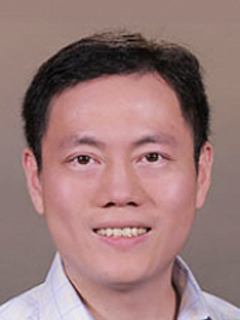HOW CAN WE HELP YOU? Call 1-800-TRY-CHOP
In This Section
Biomedical Technician Training, Asthma Diagnoses, Machine Learning

Join us in celebrating a job well done for nine trainees who completed their Biomedical Technician Training at Children's Hospital of Philadelphia, as part of a new workforce development partnership. Also featured in our news roundup this week is a new study that finds no link between COVID-19 and new asthma diagnoses, and another that reports some of the first evidence of potential therapeutic targets for Fontan-associated liver disease. CHOP researchers also investigate the impact of machine learning technology on DNA sequencing. Read on to learn more.
Biomedical Technician Training Program Honors Nine Trainees

Michelle Lewis, MS, CRA, CCMP
CHOP recognized its first cohort of nine trainees who completed the Biomedical Technician Training Program March 25 at the Roberts Center for Pediatric Research. The CHOP 12-week paid program is designed to foster in-demand skills specific to CHOP's research technician role, in partnership with University City District's West Philadelphia Skills Initiative and The Wistar Institute.
All nine candidates who completed the program were invited to interview for research technician positions at CHOP, offering a direct path to full-time, career-ladder employment.
"Joining this program and engaging in the research I'm currently conducting has given me purpose and goals to strive for in life," said Michael Nguyen, one of the nine graduates.
The Biomedical Technician Training program creates opportunities for Philadelphians with at least a high school equivalency. Participants engaged in professional development workshops, life science foundation courses, and biomedical lab orientations to help prepare them for the job requirements of a biomedical technician. This includes maintaining a sterile lab environment, assembling sterile products, stocking supplies, and documenting processes of biomedical manufacturers in supporting the creation of cell therapies.
"This program is a testament to the power of partnership," said Senior Vice President for Research Administration and Operations Michelle Lewis, MS, CRA, CCMP, who was the keynote speaker at the recognition ceremony. "It represents a collective commitment to foster a vibrant research community at CHOP, fueled by local talent. We, the organizers, are incredibly proud of your accomplishments."
Learn more about the background of the training program in this Wistar Institute press release.
Read about Nguyen's experience in this Instagram interview.
New Gene Therapy Improves Treatment for Sickle Cell Disease
Findings published in the New England Journal of Medicine provide the complete details of the critical clinical trial that led to the U.S. Food and Drug Administration's approval of exagamglogene autotemcel (CASGEVY™ , Vertex Pharmaceuticals), a gene therapy for the treatment of sickle cell disease, in December 2023.
Senior study author Stephan A. Grupp, MD, PhD, section chief of the Cellular Therapy and Transplant Section, inaugural director of the Susan S. and Stephen P. Kelly Center for Cancer Immunotherapy, and medical director of the Cell and Gene Therapy Laboratory at CHOP, was part of an international consortium that evaluated 30 patients between the ages of 12 and 35, with a history of vaso-occlusive crises (VOCs) — a blockage that results in lack of oxygen and painful episodes. Twenty-nine of the patients who received exagamglogene autotemcel did not experience VOC instances over a 12-month time, and all 30 were not hospitalized in the same period.
"In this clinical trial, sickle cell patients who were having significant issues with their disease began to see their problems resolve within months and improve their quality of life significantly," Dr. Grupp stated in a press release. Dr. Grupp was one of the principal investigators in the clinical trials that led to the approval of exagamglogene autotemcel and was the leader of the study's steering committee.
Additionally, the results of a clinical trial on the efficacy of exagamglogene autotemcel for the treatment of β-thalassemia appeared in the New England Journal of Medicine. The preliminary results of the trial led to the FDA approval of exagamglogene autotemcel for transfusion-dependent β-thalassemia in January 2024. Dr. Grupp was also one of the principal investigators for this clinical trial.
Learn more in this CHOP press release.
COVID-19 Infection Not Linked to Potential Asthma Diagnoses in Pediatric Patients
New findings published in Pediatrics reveal that SARS-COV-2 infection likely does not increase the risk of asthma development in pediatric patients. With such frequent polymerase chain reaction (PCR) testing occurring throughout the pandemic, CHOP researchers collected enough data for a large, retrospective study that allowed them to track and observe how the illness could influence the likelihood of a new asthma diagnosis.
"This well-powered study reaffirms risk factors we know contribute to asthma development and provides clinically useful information to pediatricians and providers on the absence of risk of developing asthma as a result of COVID-19," said senior study author David Hill, MD, PhD, an attending physician with the Division of Allergy and Immunology at CHOP. "We are hopeful that this study will put to rest an outstanding question on the minds of many families."
Researchers analyzed data from more than 27,000 pediatric patients who received PCR testing for SARS-COV-2 between March 1, 2020, and Feb. 28, 2021.
Although testing positive for COVID-19 had no significant impact on new asthma diagnoses, findings also indicated that children with known risk factors for developing pediatric asthma, such as race and food allergies, were more likely to associate with new SARS-COV-2 diagnoses.
Learn more in this CHOP press release.
Researchers Discover Underlying Biology Behind Fontan-Associated Liver Disease
Findings from a CHOP research study provide some of the first evidence of potential therapeutic targets for Fontan-associated liver disease (FALD), which can limit survival and increase morbidity in single ventricle congenital heart disease (SVCHD) patients.
SVCHD is a severe form of cardiac malformation in which only one of the two ventricles of the heart works properly. The study results appeared in Science Translational Medicine.
"Our findings make the case that there may be some way for us to blunt the process that leads to scarring at the cellular level," said senior study author Liming Pei, PhD, an associate professor of Pathology and Laboratory Medicine and a member of the CHOP Cardiovascular Institute. "The pathways we identified are worth studying in additional models and confirming whether that information could lead to the discovery of new therapeutic options."
Patients with SVCHD undergo a Fontan operation, a surgical procedure that is the current standard of care for this condition. Although people born with SVCHD can survive to adulthood with a Fontan circulation, they often face new life-threatening complications, including FALD.
By analyzing liver specimens from patients with early-stage disease using single-nucleus RNA-ATAC multi-omic sequencing, the researchers generated the first complete atlas of gene expression and epigenetic statuses of human FALD. The atlas revealed profound cell-type specific changes in livers with Fontan circulation, including central hepatocytes, which play a key role in proper liver function. The research team found these hepatocytes had significant metabolic reprogramming that preceded the activation of other cells closely associated with FALD, suggesting that central hepatocytes are a key part in understanding the origins of the disease.
Nature Explores Breakthrough T Cell Biology Research From CHOP Scientists
An article by Nature covered work from CHOP and Stanford University researchers that significantly impacts the future of CAR T cell therapy. Scientists found that by "supercharging" CAR T cells to make more of the FOXO1 protein, which results in gene activity similar to T memory stem cells, CAR T cells responded to cancer more quickly and lasted longer in the body to more effectively reduce solid tumors.
"What we have is an important piece of T cell biology that has been overlooked for a long time," said Evan Weber, PhD, a cell and gene therapy researcher with the Center for Childhood Cancer Research and the Raymond G. Perelman Center for Cellular and Molecular Therapeutics at CHOP. "Understanding what makes CAR T cells more likely to yield a durable response at a molecular level may help improve the design of CAR T-cell therapies and potentially benefit a wider range of patients."
Although testing the overexpression of FOXO1 has not yet transitioned from bench to bedside, researchers believe their data offers promising results for therapeutic efficacy, especially in conjunction with an ongoing clinical trial noted by Dr. Weber that explores the outcomes of genetically engineering CAR T cells to produce high levels of the c-Jun protein, which also contributes to the durability and longevity of T cells.
Read more about studies around the FOXO1 protein in this Nature post.
Researchers Investigate How Machine Learning Can Impact DNA Sequencing
A new machine-learning model may aid in methylation detection key for the regulation of gene expression, according to researchers from the Raymond G. Perelman Center for Cellular and Molecular Therapeutics and Center for Computational and Genomic Medicine at CHOP. Their study results demonstrate that the tool, called DeepMod2, can analyze all types of Oxford Nanopore flow cells and signal data formats, performing comparably to current closed-source software tools from the vendor.
"While the machine-learning model in DeepMod2 was initially developed for DNA methylation only, the framework has the potential to be extended to the analysis of different types of DNA and RNA modifications in the future, thereby providing new opportunities to address other intriguing biomedical questions," said Kai Wang, PhD, professor of Pathology and Laboratory Medicine and senior author on the study.
DNA methylation regulates gene expression, which is crucial to many biological processes like genomic stability, genomic imprinting, aging, and cancer. Sequencing tools like DeepMod2 allow Dr. Wang and colleagues to create large-scale methylation profiles of complex genomic regions that can be used as diagnostic biomarkers and therapeutic targets for cancer.
This open-source technology demonstrated a high correlation between reduced representation methylation sequencing — a method that targets important regions in the genome, enabling profiling across samples of interest — and whole-genome Nanopore sequencing, which suggests DeepMod2 is a viable, cost-effective option for methylation profiling. Another advantage of the technology includes its ability to predict imprinted regions quickly and accurately, or regions that have certain genes expressed in a parent-of-origin-specific manner, which is less resource-intensive and allows for fewer redundancies.
This study appears in Nature Communications.
ICYMI
Catch up on our headlines from our April 12 In The News:
- Society for Pediatric Research Honors Two CHOP Physician-Scientists
- AACR Recognizes 2023-2024 Research Grantees
- 'The Pulse' 10th Anniversary Program Explores Science That's Changed Lives
- Young Adults With Mood Disorders Less Likely to Obtain Driver's License Than Peers
- Novel Strategy Integrates Patient-Reported Outcomes for Primary Mitochondrial Disease
- Minds Matter Concussion Program Aids NFL in Assessment Tool Design
Keep up with our news, stories, and updates in real time by following us on X, Facebook, LinkedIn, or Instagram. Meet the minds behind the science in the Bench to Bedside podcast. Or subscribe to our newsletter to receive an email every other Friday.






